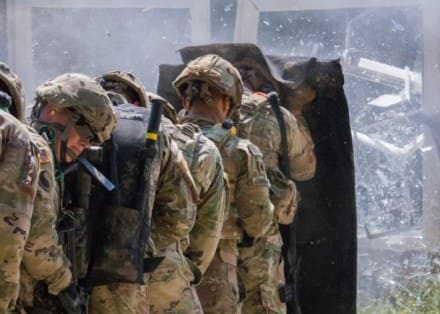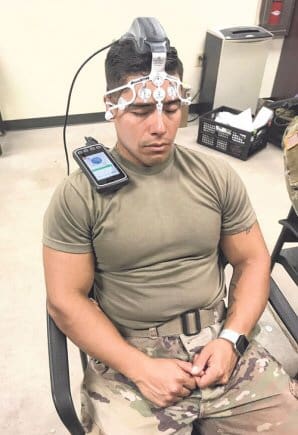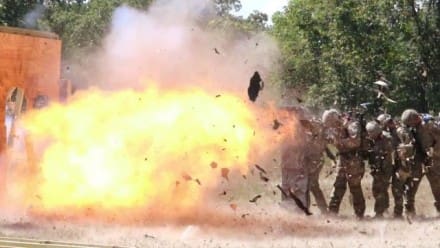FORT LEONARD WOOD, Mo. — Researchers from the Phelps Health Medical Center in Rolla, Missouri, performed clinical testing on 35 Soldiers in the Urban Mobility Breacher Course at Fort Leonard Wood last week to determine if there are repeatedly present biological signs after traumatic brain injury, or TBI.

Officials said Soldiers in the UMBC were chosen as subjects due to their training, which requires them to endure concussive blasts, using light and heavy explosives to force entrance into otherwise inaccessible structures.
Medical personnel are searching for these signs, named biomarkers, through blood samples, urinalysis, and a new portable, cell-phone sized form of electroencephalogram, or EEG, called “BrainScope.”
Rosanne Naunheim, a Neurologist at Washington University in St. Louis ran BrainScope on Soldiers before and after their participation in the course this week.
“[The device] can diagnose if there’s most likely been previous concussive brain injury,” said Donald James, senior vice president of research and government affairs at Phelps Health.
“Before [Soldiers] have blast exposure with larger blasts, we’re doing EEGs and drawing blood work,” he said. He confirmed the researchers would return after the training to test for biomarker indication of TBI.

According to Naunheim, BrainScope determines likelihood of previous TBI by measuring the speed at which an electrical signal travels from the brain to the electrodes in the device and back to the brain, and then comparing subjects’ results against normal scores for their age range.
“We’re noticing a lot of people start with fairly low scores here (at the fort), because they may have had blast injuries in the past,” Naunheim said.
On a scale of 0 to 100, with 50 being normal, “We’re seeing quite a few people that have scores 0 to 10 even, which is quite low.”
Matthew Doellman, who spent 13 years in the Army, saw combat as a trauma nurse in the Middle East, and worked at General Leonard Wood Army Community Hospital, now serves as director of the Phelps Health program leading the research being done on base.
He said based on his experiences, the new EEG device is “without a doubt” critical to preserving the fighting capability of the force.
“When I was deployed to Afghanistan in 2011, we didn’t have a CAT scan machine,” which, he said, can be too large, expensive and slow to provide results in a forward operating environment.
Phelps Health officials agreed on the field application of the new device.
“This can be done in the field,” James said. “This technology could be right there in the medic station at the Forward Operating Base in any battle center.”
“The reason why that’s important is because a lot of times when you’re in Iraq, Afghanistan and other theatres of operation, as a unit commander you’re trying to make these determinations; ‘Do I need to send my medevac pilots out in this bad weather because this Soldier, we think he needs help,'” Doellman added.

Testing for TBI indicators through urinalysis began five years ago, after doctors discovered that multiple types of cancer could be diagnosed through biomarkers present in urine, according to James.
“I think we’re in the infancy of major breakthrough in, one, diagnosis of traumatic brain injury; and two, then coming up with innovative treatments that mitigate permanent (brain) damage,” he said, referring to this research as unprecedented.
Researchers said that if they found repeated presence of TBI biomarkers in the blood and urine, combined with results from the portable EEG, Soldiers and their commanders could see mitigation of permanent brain damage.
“[With] the research we’re doing today, hopefully the Soldier of the future will have less problems with TBI, and then they’ll live longer lives without any kind of detriment because of a blast or some kind of concussive event,” Doellman said.
The research conducted at Fort Leonard Wood is part of an Army Surgeon General-signed cooperative effort among researchers from Phelps Health Medical Center and four universities: Missouri University of Science and Technology, Washington University in St. Louis, University of Missouri at Columbia and University of Missouri at Kansas City.
By Sam Campbell, Leonard Wood


Now if you can just get the VA onboard and quit denying everything …..
I was coming here to post the same thing. My battle with the VA seems to be larger than any I engaged in within MIL or LE service, at least in terms of long term damage and aggravation.